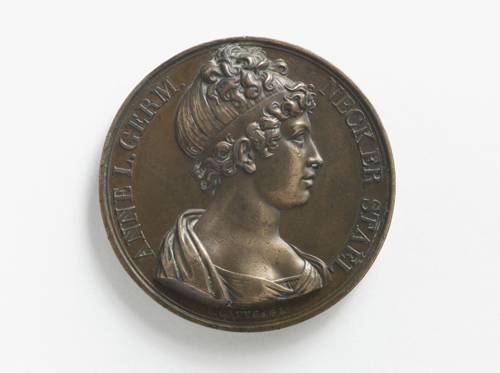
FAQ About Germaine de Staël

Who was Germaine de Staël?
Germaine de Staël was a prominent French-Swiss writer, intellectual, and salonnière of the late 18th and early 19th centuries. She is best known for her novels, such as Corinne and Delphine, and her political treatises. De Staël was an influential figure in literary and political circles, advocating for the spread of Enlightenment ideals and promoting Romanticism in literature. Her intellectual salons attracted leading thinkers of the time, contributing significantly to European culture and society.

What are some of Germaine de Staël's most famous works?
Some of Germaine de Staël's most renowned works include the novels Delphine (1802) and Corinne, or Italy (1807). Beyond fiction, she wrote extensively on political, historical, and philosophical topics, including her critical and comparative analysis in De l'Allemagne (On Germany, 1813), which introduced German Romanticism to French audiences. Her work Considerations on the Principal Events of the French Revolution is also highly regarded for its in-depth political analysis.

What was Germaine de Staël's influence on European literature?
Germaine de Staël played a crucial role in the transition from Enlightenment to Romanticism in European literature. Through her essays, novels, and salon discussions, she introduced and popularized Romantic ideas, particularly emphasizing emotion and individualism over Enlightenment rationalism. Her works helped shape the literary tastes of her time by introducing German Romantic literature to French readers and advocating for emotional depth and national character in literature.

How did Germaine de Staël impact political thought?
Germaine de Staël had a significant impact on political thought through her writings and political engagement. She was an advocate for liberal values, emphasizing the importance of individual freedoms and constitutional government. Her experiences during the tumultuous times of the French Revolution and Napoleonic era informed her views, which she articulated in works like Considérations sur la Révolution française. Her commitment to freedom of thought and resistance against autocracy influenced subsequent liberal thinkers across Europe.

What role did Germaine de Staël's salons play in her influence?
Germaine de Staël's salons were central to her influence as an intellectual. These gatherings provided a platform for exchanging ideas among some of the most prominent thinkers, writers, and politicians of her time. She facilitated discussions that crossed national and ideological lines, promoting Enlightenment and later Romantic ideals. Her salons helped form a network that allowed for the spread of progressive thoughts and played a significant role in her cultural and political influence in Europe.

Why was Germaine de Staël exiled from France?
Germaine de Staël was exiled from France primarily due to her opposition to Napoleon Bonaparte. Her advocacy for republican and liberal ideas clashed with Napoleon's authoritarian regime. Her own influential presence and outspoken criticisms made her a perceived threat to Napoleon, who ordered her exile in 1803. Despite this, she continued to write and engage with intellectual and political movements across Europe during her exile.

In which countries did Germaine de Staël spend her exile?
During her exile, Germaine de Staël spent time in several countries. She initially moved to Switzerland, residing at her family estate, Coppet. She also traveled extensively throughout Europe, including stays in Germany, Italy, and England. During these travels, she deepened her philosophical and literary knowledge, engaging with leading intellectuals and academics, which further enriched her works and allowed her to continue influencing the European intellectual scene from abroad.

What is the significance of Germaine de Staël's work 'De l'Allemagne'?
'De l'Allemagne' (On Germany) is a significant work by Germaine de Staël, as it introduced and extolled the virtues of German culture, literature, and philosophy to the French audience. Published in 1813, it provided a comparative analysis of French and German societies, emphasizing the originality and emotional depth of German Romanticism. Its publication was initially suppressed by Napoleon, who feared its potential influence, but it later became instrumental in promoting cross-cultural literary and philosophical exchanges across Europe.

How did Germaine de Staël contribute to Romanticism?
Germaine de Staël was a key proponent of Romanticism through her critical writings and advocacy for the movement's ideals, such as emotion, individuality, and the sublime. Her works often contrasted the rationality associated with Enlightenment thought with the depth of emotion and spiritual exploration that characterized Romantic literature. By introducing German Romantic literature to French readers, she played a pivotal role in shaping the Romantic movement across Europe, encouraging a focus on inner experience and personal expression.

What was Germaine de Staël's relationship with Napoleon Bonaparte?
Germaine de Staël's relationship with Napoleon Bonaparte was fraught with tension and opposition. Staël was a vocal critic of Napoleon's despotic rule and his suppression of individual liberties, which she passionately defended in her writings. Her political and cultural influence was seen as a threat to Napoleon, leading to her exile in 1803. Despite her opposition, Staël's works continued to spread liberal and Romantic ideas that indirectly challenged Napoleon's regime.
